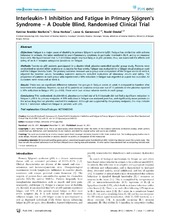| dc.contributor.author | Norheim, Katrine Brække | en_US |
| dc.contributor.author | Harboe, Erna | en_US |
| dc.contributor.author | Gøransson, Lasse Gunnar | en_US |
| dc.contributor.author | Omdal, Roald | en_US |
| dc.date.accessioned | 2012-08-08T12:10:49Z | |
| dc.date.available | 2012-08-08T12:10:49Z | |
| dc.date.issued | 2012 | eng |
| dc.Published | PLoS ONE 7(1): e30123 | en |
| dc.identifier.issn | 1932-6203 | |
| dc.identifier.uri | https://hdl.handle.net/1956/5927 | |
| dc.description.abstract | Objectives Fatigue is a major cause of disability in primary Sjögren's syndrome (pSS). Fatigue has similarities with sickness behaviour in animals; the latter mediated by pro-inflammatory cytokines, in particular interleukin (IL)-1, acting on neuronal brain cells. We hypothesised that IL-1 inhibition might improve fatigue in pSS patients; thus, we examined the effects and safety of an IL-1 receptor antagonist (anakinra) on fatigue. Methods Twenty-six pSS patients participated in a double-blind, placebo-controlled parallel group study. Patients were randomised to receive either anakinra or a placebo for four weeks. Fatigue was evaluated by a fatigue visual analogue scale and the Fatigue Severity Scale. The primary outcome measure was a group-wise comparison of the fatigue scores at week 4, adjusted for baseline values. Secondary outcome measures included evaluation of laboratory results and safety. The proportion of patients in each group who experienced a 50% reduction in fatigue was regarded as a post-hoc outcome. All outcomes were measured at week 4. Results There was no significant difference between the groups in fatigue scores at week 4 compared to baseline after treatment with anakinra. However, six out of 12 patients on anakinra versus one out of 13 patients on the placebo reported a 50% reduction in fatigue VAS (p = 0.03). There were two serious adverse events in each group. Conclusions This randomised, double-blind, placebo-controlled trial of IL-1 blockade did not find a significant reduction in fatigue in pSS in its primary endpoint. A 50% reduction in fatigue was analysed post-hoc, and significantly more patients on the active drug than on placebo reached this endpoint. Although not supported by the primary endpoint, this may indicate that IL-1 inhibition influences fatigue in patients with pSS. | en_US |
| dc.language.iso | eng | eng |
| dc.publisher | Public Library of Science | eng |
| dc.rights | Attribution CC BY | eng |
| dc.rights.uri | http://creativecommons.org/licenses/by/2.0/ | eng |
| dc.title | Interleukin-1 Inhibition and Fatigue in Primary Sjögren's Syndrome – A Double Blind, Randomised Clinical Trial | en_US |
| dc.type | Peer reviewed | |
| dc.type | Journal article | |
| dc.description.version | publishedVersion | en_US |
| dc.rights.holder | Copyright: © 2012 Norheim et al. This is an open-access article distributed under the terms of the Creative Commons Attribution License, which permits unrestricted use, distribution, and reproduction in any medium, provided the original author and source are credited. | |
| dc.identifier.doi | https://doi.org/10.1371/journal.pone.0030123 | |
| dc.identifier.cristin | 932816 | |
| dc.subject.nsi | VDP::Medical disciplines: 700::Basic medical, dental and veterinary science disciplines: 710::Medical immunology: 716 | eng |

